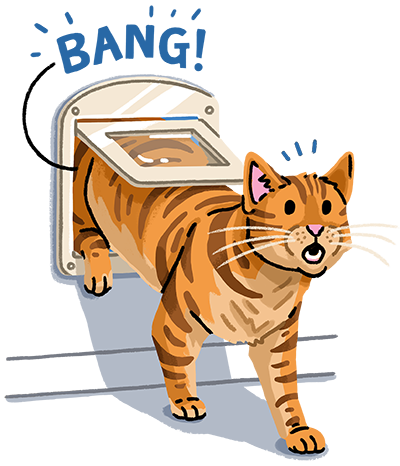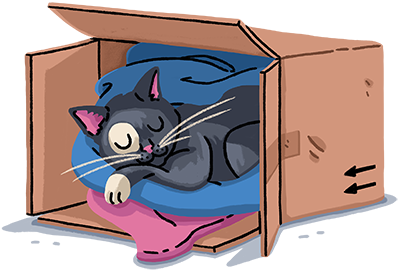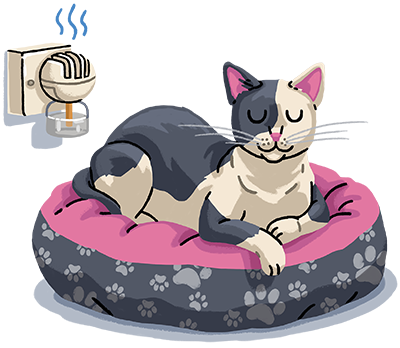It can be difficult to detect if your cat has a noise phobia. Nevertheless, noise phobia can have a serious impact on feline wellbeing. Find out how you can help your cat become less scared of loud noises.
Cats associate loud noise with danger, which is why they have a natural aversion to sudden bangs and booms. But while it’s normal for cats to dislike noise to a certain extent, some cats can be so scared of noises that they develop heightened sensitivity to sound, or so-called ‘noise phobia’.
What noises are cats scared of?
Cats can be scared of a wide range of noises, including doorbells, fireworks, household appliances, lawnmowers, slamming doors and thunder, as well as the honking of car horns or the loud blare of car alarms. Noises can be a particular problem for cats at certain times of year, such as Bonfire Night.
What causes noise phobia in cats?
Noise phobia is a problem that can stem from an early age. If cats are not exposed to the everyday sounds of people and other animals early on, it’s far more likely that they will grow up to be fearful of them. A kitten who has been reared in a fairly noisy, bustling home will be less likely to develop a noise phobia than one that has been raised in a quiet environment.
Cats can also become sensitive to sound later in life, particularly if they begin to lose their sight or develop dementia. If you’re worried this could be the case, take a trip to the vet to get your pet checked out.
What are the signs that a cat is noise-phobic?
When a cat is noise-phobic, they will tend to disappear, so their owner may not know that they are frightened. Where cats have indoor and outdoor access – via a cat flap, for example – their owner might not realise their pet is hiding somewhere outside.
Some cats with a noise phobia might show a displacement activity, such as licking themselves. Their owner might assume that their pet is engaged in grooming when actually the licking is an act of self-comfort. If you’re not sure whether your cat’s licking is a cause for concern, keep an eye on them to see whether they do it in response to certain triggers, such as the TV being turned on or you using the vacuum cleaner.
Licking as a displacement activity tends to be quicker licking than normal grooming, and quite brief. Grooming tends to be more methodical and take longer as the cat works through the different areas of the body, often in a particular order.
A cat with a noise phobia might also be curled up tightly, seemingly asleep, although they are actually awake and listening in to their surroundings. This is another coping strategy. Not eating, panting and trembling can also be signs that your cat is afraid of loud noises.
How can you help a cat with a noise phobia?
If you suspect that your cat is suffering from a noise phobia, ask your vet for a referral to a qualified pet behaviourist, who will be able to assess the situation and advise you on the best course of action for your cat.
This course of action could consist of a counter-conditioning and desensitisation programme, which is a structured way of introducing sounds at a very low level and increasing the level as your cat gets used to it. This needs to be done under expert guidance – as, if done incorrectly, it can make the problem worse.
Here are some practical things you can do at home to ease your cat’s anxiety if they appear to be suffering from a noise phobia:

Allow for escape. A cat’s natural way of dealing with a fear is the flight response, so it’s important that they are able to get away. Cats can also sometimes become aggressive when they’re frightened, so if you feel your cat is really agitated, avoid picking them up to reassure them – even though you might want to!

Provide safe places. Cats naturally like to hide in cupboards and under beds, so make sure that there are plenty of accessible places that your pet can go to when they are feeling scared of loud noises. You could use some thick cardboard boxes with blankets around them for your cat to burrow in and feel safe. Also, provide them with high-up spaces, as cats feel safer when they’re higher up.

Take the natural approach. There are pheromone and nutraceutical products that you can buy over the counter that can help to calm an anxious cat with a noise phobia. You could try plugging in a pheromone diffuser near your cat’s preferred safe place. It’s best to get further advice from your vet and a qualified behaviourist on this approach.
